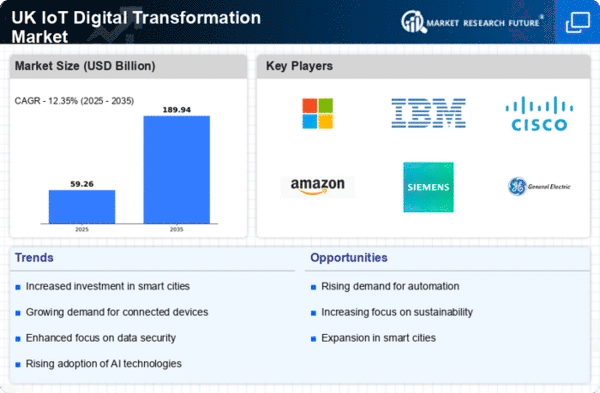Government Initiatives and Support
The UK government is actively promoting the adoption of IoT technologies as part of its broader digital transformation strategy. Initiatives such as the Digital Strategy and the Industrial Strategy Challenge Fund are designed to foster innovation and investment in the iot digital-transformation market. These programs aim to enhance the UK's position as a leader in digital technologies, with funding opportunities available for businesses that implement IoT solutions. Recent reports indicate that government funding in this sector has increased by 30% over the past year, reflecting a strong commitment to advancing digital infrastructure. This supportive environment is likely to encourage more companies to invest in IoT technologies, thereby driving growth in the iot digital-transformation market.
Increased Connectivity and 5G Rollout
The rollout of 5G technology in the UK is set to revolutionize the iot digital-transformation market by enabling faster and more reliable connectivity for IoT devices. With 5G, the potential for real-time data transmission and enhanced device interconnectivity is significantly improved. This advancement is expected to facilitate the deployment of more sophisticated IoT applications across various industries, including healthcare, manufacturing, and transportation. As 5G networks become more widespread, the number of connected devices is projected to increase exponentially, potentially reaching 1 billion by 2027. This connectivity boom is likely to drive innovation and investment in the iot digital-transformation market, as businesses seek to capitalize on the capabilities offered by 5G.
Rising Demand for Automation Solutions
The IoT Digital Transformation Market is experiencing a notable surge in demand for automation solutions across various sectors in the UK. Businesses are increasingly seeking to enhance operational efficiency and reduce costs through the integration of IoT technologies. According to recent data, the automation market is projected to grow at a CAGR of 25% over the next five years. This trend is driven by the need for real-time data analysis and decision-making capabilities, which IoT solutions provide. As companies strive to remain competitive, the adoption of automated systems is becoming essential, thereby propelling the growth of the iot digital-transformation market. Furthermore, the push towards Industry 4.0 is likely to further accelerate this trend, as organizations look to leverage IoT for smarter manufacturing processes.
Growing Focus on Operational Efficiency
In the UK, businesses are increasingly prioritizing operational efficiency as a key driver for adopting IoT technologies. The ability to monitor and optimize processes in real-time is becoming crucial for maintaining competitiveness. The iot digital-transformation market is benefiting from this trend, as organizations leverage IoT solutions to streamline operations and reduce waste. Data suggests that companies implementing IoT solutions can achieve operational cost reductions of up to 20%. This focus on efficiency not only enhances productivity but also contributes to sustainability goals, as reduced resource consumption aligns with environmental objectives. As such, the drive for operational efficiency is a significant factor propelling the growth of the iot digital-transformation market.
Emerging Use Cases in Various Industries
The iot digital-transformation market is witnessing the emergence of diverse use cases across multiple industries in the UK. Sectors such as agriculture, healthcare, and logistics are increasingly adopting IoT solutions to address specific challenges. For instance, precision agriculture is utilizing IoT sensors to optimize crop yields, while healthcare providers are implementing remote patient monitoring systems to enhance patient care. Recent studies indicate that the adoption of IoT in these sectors could lead to efficiency gains of up to 30%. As more industries recognize the potential benefits of IoT technologies, the market is likely to expand, driven by innovative applications tailored to meet unique industry needs.
















